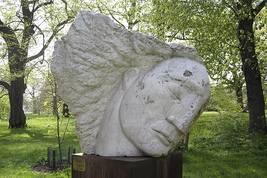
It’s not newly acquired beauty expertise that has me leaving off the eyeliner. It has more to do with crying, which causes made up eyes to sting and leaves cheeks streaked and smudged.
In the last year there have been special reasons for tears – a son whose wife is suddenly deceased leaving him with a four-year-old daughter, another son leaving his wife to make a connection on the east coast, and my own exit from a long-term relationship. Now add Jennifer, a therapist who encourages not masking past pain; keeping my eyes dry appears impossible.
I wonder if the Buddha wept as he realized that pain is inevitable, but suffering is optional. Stretching to accept such truth, I try to be at peace with present and past pain, through which I can yet become what Rumi calls “a mighty kindness.”
Often I turn to Rumi for truth shaped like a poem. In “Not Here,” in praise of the “broken-open place,” Rumi talks of human woundedness.
There's courage involved if you want to become truth.
There is a broken-open place in a lover.
Where are those qualities of bravery and sharp compassion?
What's the use of old and frozen thought?
I want a howling hurt.
This is not a treasury where gold is stored; this is for copper.
We alchemists look for talent that can heat up and change.
Lukewarm won't do.
Halfhearted holding back, well-enough getting by?
Not here.
Reading Rumi on couragously wanting “a howling hurt,” I heard again my therapist, Jennifer, praise me for being willing to befriend my pain. As a practiced deflector of praise, I was quick to dismiss my sorry tears and suggest that some might say “attending and befriending” myself was narcissistic.
But even before being beset by family tragedies, I had chosen to be in therapy. My plan was a quick fix, an emotional realignment so I could enjoy my girlfriend on a cruise to Mexico. The therapist, however, didn't think I needed fixing, despite how explicit I was about what wasn’t working. So began the crying.
Month followed month, tearful session after tearful session. I re-experienced and identified with feelings about myself that went back to a childhood of disconnection. All so familiar. Meanwhile, the cruise sailed without me.
I cried my way back through a childhood in boarding schools, to painful and scarring accidents, to raging jealousies and competition within the family, and to bouts of mania and depression.
I have read and heard of so many in therapy further demoralized at re-experiencing the sadness they thought they had put behind them. And it’s no great help when waves of shame come as one considers one’s own suffering as inconsequential in the face of other’s childhood tragedies. And yet all the wisdom tells us that the best way out is always through. So on we go, facing pain.
Sometime into the second month of tearful sessions, Jennifer introduced me to John Welwood’s book Perfect Love, Imperfect Relationships and that led to turning inward to feeling my own yearning for love and disconnecting those feelings from any person. This was also a cause for pain because I had no strong memory of having been loved to yearn for. Then my friend Kate found Buddhist teacher and psychotherapist Tara Brach and we listened to podcasts recorded in Bethesda, MD and from this followed a deliberate practice of meditation, with sittings at the Zen Center in San Francisco and at the East Bay Meditation Center, as well as at my own UU church.
Once again I turn to a Rumi poem for truth. From “Childhood Friends:”
"Trust your wound to a teacher's surgery.
Flies collect on a wound. They cover it,
those flies of your self-protecting feelings,
your love for what you think is yours.
Let a Teacher wave away the flies
and put a plaster on the wound.
Don't turn your head. Keep looking
at the bandaged place. That's where
the Light enters you.
And don't believe for a moment
that you're healing yourself."
All my teachers – Jennifer, Tara, Kate, Rumi, the lecturers at meditation practice – hold up mirrors I have feared to look into, afraid to see a face I could not look at with compassion and forgiveness. Now, the light by which I see isn’t my light at all. And it isn’t the light I had expected. And in the light, I look quite all right, even without eyeliner.
 RSS Feed
RSS Feed